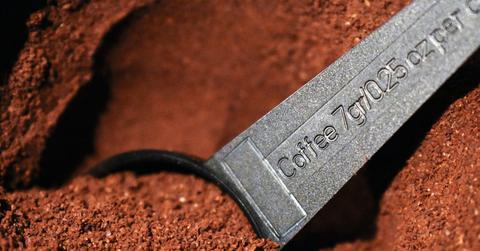Scientists Discover New Way To Convert Coffee Waste Into Cleaner Biofuels
With over 10 million pounds of coffee created worldwide, there's an extraordinary amount of waste left once its brewed. One of the ways to reuse the product is by turning it into biofuel, and Lancaster University has sped up the process.
Updated May 22 2019, 4:48 p.m. ET
One waste product that can be turned into something useful is coffee grounds. After the grounds have been used to make fresh coffee, the oil can be extracted to create biofuel. However, due to the time and determination needed for the process, it wasn’t a viable option for many people. British scientists may be changing that way of thinking, however, after discovering a shortcut for the process.
Coffee ground waste is significant across the world. It’s what fuels many of us in our mornings and over 10 billion pounds of it is produced annually. Much of it is simply thrown away. From the grounds used at home to many coffee shops in the area, most of that waste is dumped in the trash and never thought of again.
All of that waste turns into pollution that can affect our waters. There’s been multiple ways people have found to recycle them. Those grounds can be turned into coffee flour, used to create tea, and it can grow tropical mushrooms. They can also be used to fuel cars.
This process from coffee grounds to biofuel begins by mixing the waste with the chemical hexane. That is a specific solvent found in gasoline and it’s safe and cheap to use. After the mixture is heated to a 140-degree Fahrenheit temperature, the hexane evaporates in a few hours. Methanol is then fused with a catalyst (something that accelerates the mixing) in the leftover substance, and finally the glycerol created in the product is extracted out to create biodiesel fuel.
With so much coffee waste being produced, there isn’t enough time to reuse a lot of it with the lengthy conversion process. That’s why a team of scientists at Lancaster University have developed a shortcut that cuts the time all the way down to 10 minutes.
Instead of using hexane, that chemical is passed on and methanol is fused with a specific catalyst, sodium hydroxide. That mixture is placed directly in with the used grounds. It immediately extracts the oil from the waste. The leader of the experiment and professor in the engineering department of the university, Dr. Vesna Najdanovic-Visak, explains in a report published by the Journal of Environmental Chemical Engineering that this new step “could significantly cut down biodiesel production costs.”
Through an article by Phys.org, the professor also adds:
"Our method vastly reduces the time and cost needed to extract the oils for biofuel making spent coffee grounds a much more commercially competitive source of fuel...A huge amount of spent coffee grounds, which are currently just being dumped in landfill, could now be used to bring significant environmental benefits over diesel from fossil fuel sources."
Biofuel increasingly becomes a great compliment to gas as a renewable resource. Those natural oils from plants, which can even be taken from something like used coffee grounds that have no further use, can be blended into a useful substance to fill cars with. The efficiency gained from this study will make the transition process even better.
